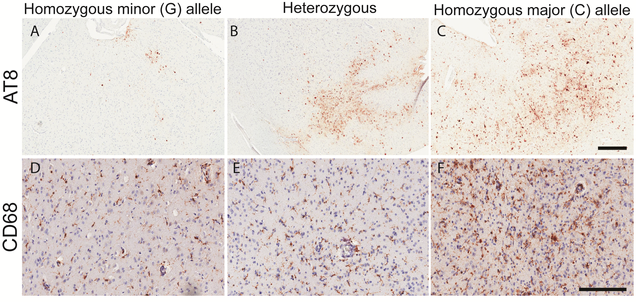Genetic Risk Factor for CTE Detected
Findings May Offer Insight into How CTE Occurs
TMEM106B is one of the first genes to be implicated in CTE. It may partially explain why some athletes present with severe CTE symptoms while others are less affected despite similar levels of head trauma.
 Representative images of CTE tau pathology (A-C) and neuroinflammation (D-F) observed in each TMEM106B genotype. Pathology is most severe in cases with 2 major alleles. Images are taken from the brain region where CTE pathology first begins.
Representative images of CTE tau pathology (A-C) and neuroinflammation (D-F) observed in each TMEM106B genotype. Pathology is most severe in cases with 2 major alleles. Images are taken from the brain region where CTE pathology first begins.
The study provides preliminary evidence that this genetic variation might help predict which individuals are at greater risk to develop severe CTE pathology and dementia, according to the researchers. It also provides insight into the disease mechanism underlying CTE, which could aid in the development of biomarkers for diagnosis during life and in the identification of targets for treatments.
Researchers from BUSM and the VA Boston Healthcare System (VABHS) studied 86 former contact-sport athletes whose brains were donated to the VA-BU-CLF brain bank and found to have evidence of CTE, but no other pathology. The athlete brains were examined for genetic variation in TMEM106B, a gene thought to be involved in the brain’s inflammation system. Overall, the genetic variation was not different in those with CTE compared to those without. “However, among the athletes with CTE, variation did predict increased CTE pathology and brain inflammation. Additionally, the risk allele increased the likelihood of developing dementia by 2.5 times suggesting the variant might predict an increased risk for developing the symptoms of CTE,” explained first author Jonathan Cherry, PhD, postdoctoral fellow in neurology at BUSM.
“These findings may help explain why some individuals experience more severe CTE related outcomes while others are spared despite similar exposure to contact sports. By better understanding why some individuals are more at risk for CTE, we can identify novel therapeutic targets to help treat all with the disease,” said corresponding author Thor Stein, MD, PhD, neuropathologist at VA Boston Healthcare System and assistant professor of pathology and laboratory medicine at BUSM.
The researchers caution that it is still unclear what variation in TMEM106B means on an individual level for people at risk for CTE. Therefore, genetic testing for clinical care is not currently recommended.
The study appears in the journal Acta Neuropathologica Communications.
Jesse Mez, MD, MS, assistant professor of neurology at BUSM is the study’s co-first author. Ann McKee, MD, Chief of Neuropathology, VA Boston Healthcare System, and Director of the BU CTE Center is the co-senior author.
View all posts